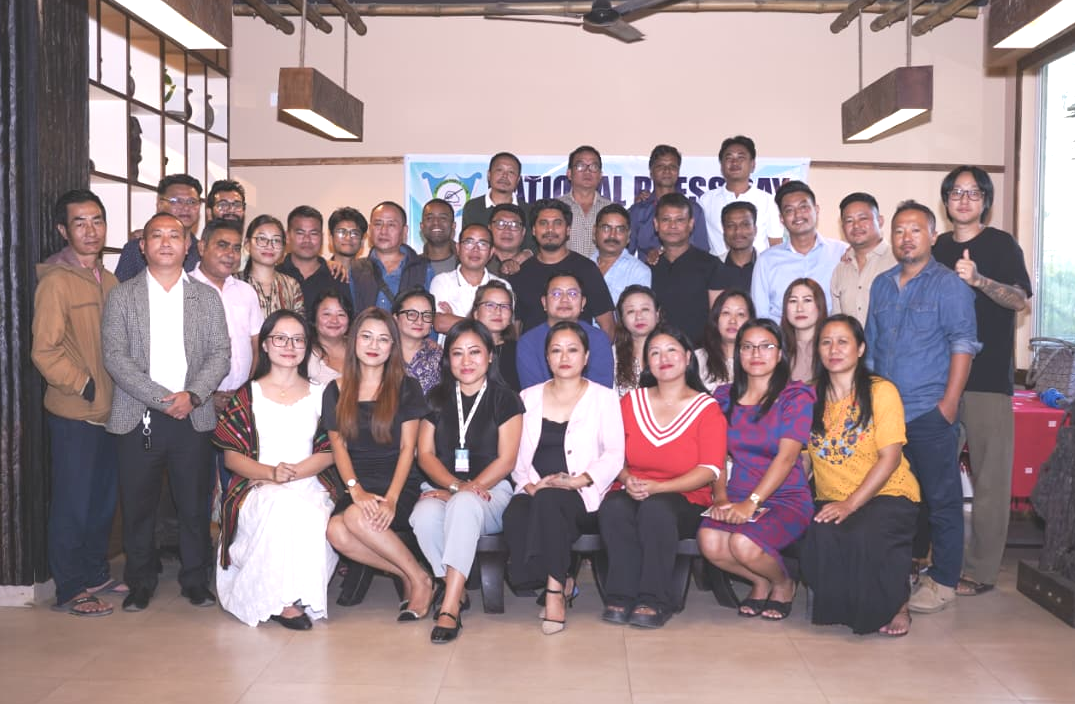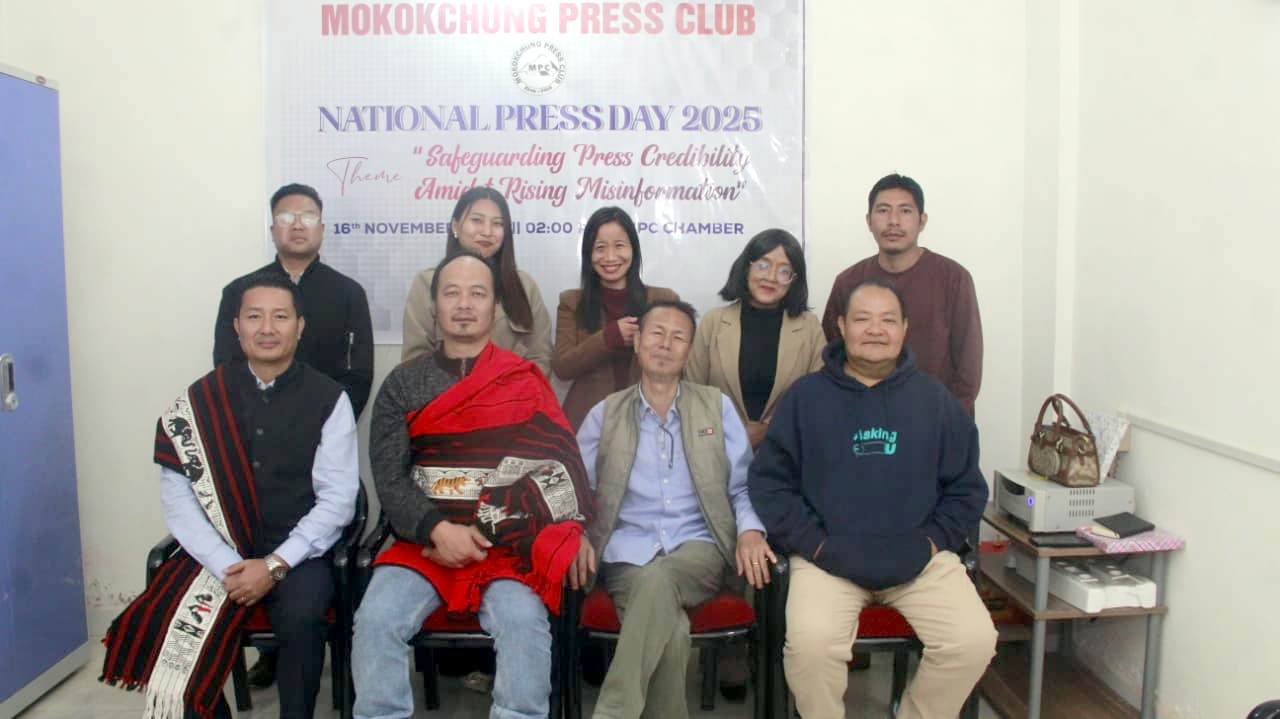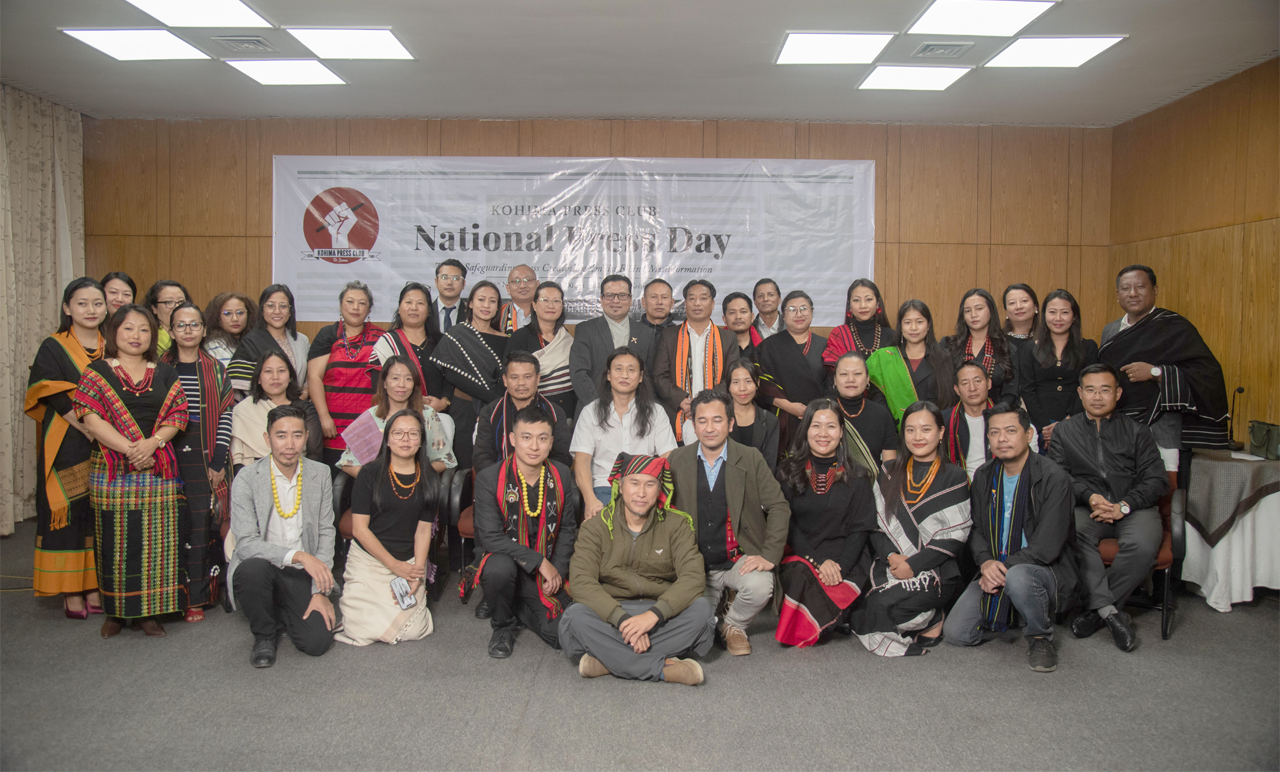Kohima Press Club (KPC) celebrated National Press Day under the theme “Safeguarding press credibility amidst rising misinformation” on November 16 at Hotel Japfü, Kohima.
Guest speaker, Akum Longchari, publisher of The Morung Express, described the Nagaland media as a home-grown industry, built from the ground up by elders and strengthened by subsequent generations. He highlighted the dedication of journalists committed to integrity, fact-based truth, accuracy, transparency, accountability, and fairness.
He emphasized that this commitment must be rooted in independence, allowing the media to operate credibly, without fear, bias, or conflicts of interest. He stated that Press Day serves as a fitting reminder to uphold these ethics in everyday practice.
Drawing on twenty years of experience working with every part of a news organization, from editorial and reporting to design and distribution, Longchari noted that this background has given him a unique perspective as both an insider and an outsider.
Speaking on the theme “Safeguarding Press Credibility Amidst Rising Misinformation,” he shared two dilemmas and concluded with a vox populi—the voice of the people. He explained that while misinformation is ancient, its modern scale and speed on digital platforms have created a polarized media ecosystem, making the differentiation between fact and non-fact more critical than ever.
He cited Manish Maheshwari, former head of Twitter India, who observed that the 21st century will be defined by “who controls truth.” Longchari argued that this framing reduces truth to a commodity that can be owned and weaponized, a matter of “truth sovereignty” and realpolitik. This militarization of truth for confrontation and polarization endangers the fact-based truth that has the power to connect, free, and heal, he added.
He referenced scholar Mahmood Mamdani’s two types of truth: one that brings unresolved tensions to light, and another that obscures unpleasant realities. Longchari stated the media must distinguish between them. In the Naga context, this dilemma is intensified by history, geography, and politics, which often veil the truth with cognitive biases. This leads to a situation where subjective feelings are often perceived as more important than factual truth, creating a challenge for the media to bridge this gap, he said and quoted George Orwell, noting that “telling the truth is a revolutionary act.”
Longchari compared journalism to storytelling, stating both must harness the power of context to build credibility and trust with their audience. He then outlined the current Naga reality, where the political situation is in flux, offering an opportunity for collective healing and reconciliation. Simultaneously, globalization, individualism, and state-led narratives are transforming Naga society, reducing its culture to a “living museum” for tourism and creating social fragmentation. In this turbulent mix of contradictions, new narratives challenge the old, and the Naga identity is impacted by assimilation, consumerism, and corruption.
Amid these shifting power dynamics, he urged the media to be acutely aware of who is defining narratives and for what purpose. He critiqued the current lack of new, imaginative stories, which reinforces a conformist status quo.
He called for the Naga media to objectively reflect on its moral courage to speak truth to power by rising above established positions and official statements; cultivating in-depth, fact-led reporting that uncovers the truth behind headlines; investigating root causes by questioning power structures; and critiquing whether policies and transitions truly represent the people’s interests.
Defining journalism as a dynamic praxis that evolves through action and reflection, he encouraged everyone on Press Day to celebrate its evolving nature.
In conclusion, he shared a vox populi on how the media can empower citizens and how journalists can improve reporting. He firmly stated that the 21st century should not be about controlling truth. Instead, the media in Nagaland must reimagine itself to become a credible entity that nurtures critical thinking through quality, fact-based news, emancipating truth for the dignity of a shared humanity.
This year’s KPC Impact Journalism Award was presented to Reyivolu Rhakho.
The KPC NBOCWWB Media Fellowship 2025 was awarded to Chizokho Vero, Shongmo and Yarden Jamir.
Dimapur Press Club:

Dimapur Press Club celebrated National Press Day on Sunday on the theme, “Safeguarding press credibility amidst rising misinformation” with Associate Editor, The Morung Express, Dr Moalemba Jamir as the theme speaker.
Speaking on the occasion, Dr Moalemba called credibility the “single most vital asset” of the media and urged journalists and news organizations in Nagaland to confront the growing crisis of misinformation by strengthening transparency, ethics and verification.
Dr Jamir said the greatest challenge facing journalists today is not lack of technology or platforms, but the erosion of public trust in the age of blurred information spaces. “On a single screen, the public encounters everything — news, political messaging, rumours, entertainment, and promotional content. Very often, all of this appears in similar formats. The lines have blurred,” he said, warning that credibility has become “more urgent than ever.”
He stressed that credibility is the anchor of journalism and its loss affects not only individual reporters but entire institutions and communities. “It is what allows the public to trust us even when the truth is difficult, even when the facts are uncomfortable,” he noted.
Dr Jamir said that before addressing the external threats of misinformation, the media must examine internal weaknesses. He raised concern over the emergence of unregulated online platforms that mimic news outlets but have no editorial accountability, as well as the lack of transparency even among established organisations.
He stressed the need for every newsroom to be clear about who they are and how they operate, calling it central to credibility. He noted that anyone could create a page, website, or digital outlet, leading to visibility without accountability, and added that many unregulated platforms do not have clear editorial policies, websites, or even an “about us” section. He said the public sees the content but not the institution behind the news.
Dr. Jamir said this gap is not limited to new entrants and includes legacy and traditional media.
Citing the example of the Nagaland Tribune, which openly publishes its editorial leadership and organisational details, he said such transparency should be the norm for all.
He addressed what he called a “structural form of misinformation”: the practice of certain news outlets asking for payment in exchange for covering routine events such as anniversaries, releases, or departmental functions.
“When payment is involved and undisclosed, the public assumes the story was selected because it was newsworthy. That assumption becomes misleading,” he said. While acknowledging the financial pressures facing media houses, he warned that treating news coverage as a service-for-hire undermines public trust in journalism.
“This is not about pointing fingers,” he clarified. “But when basic journalistic duty becomes, even unintentionally, a paid service, it weakens the foundation of our profession.”
Jamir highlighted four major external threats: The rise of unregulated digital platforms, the speed-driven culture of online newsrooms, increasing sensationalism, and ethical inconsistencies such as unlabelled sponsored content and unchecked commentary.
He also warned that artificial intelligence has amplified the challenge of misinformation, enabling rapid creation of manipulated images, videos, and voices.
He said AI-generated images, altered videos, voice clones, synthetic media, and fabricated text could cause real harm, especially in contexts where identity, land, and law and order are sensitive issues.
“AI is not the enemy,” he said. “But it magnifies our weaknesses. If verification is weak, AI will amplify the damage. If editorial boundaries blur, AI will exploit the confusion. If the public cannot distinguish journalism from content, AI will feed that uncertainty.”
Download Nagaland Tribune app on Google Play

Jamir laid out a series of practical steps for strengthening press credibility, urging media houses to prioritise transparency, publish detailed “About Us” information, separate editorial and commercial functions, and label sponsored content clearly.
He emphasised the need to reinforce verification practices, adopt newsroom ethics codes, and organise regular digital-literacy training. He also suggested exploring collaborative mechanisms such as a common Media Charter for Nagaland, a joint ethics committee, and voluntary transparency audits.
“A media-literate public is our best ally against misinformation,” Jamir noted, calling on Dimapur Press Club to organise fact-checking workshops and awareness programmes.
Dr Jamir said the credibility crisis is also an opportunity for the press in Nagaland to lead by example.
“Credibility is not preserved through slogans. It is preserved through the stories we verify, the lines we refuse to cross, the disclosures we make, and the corrections we issue,” he said. “Let us build an ecosystem where credibility is non-negotiable.”
Earlier, in her presidential address, Henlly Phom stated that the day celebrates the power of a free and fearless press. She acknowledged the efforts of journalists who work to bring truth to light and remain committed to journalistic integrity. She also urged journalists to continue striving for excellence, promoting fact-based reporting, impactful storytelling, and standing for the truth.
A short Q&A session followed, with Dr. Jamir and the Dimapur Press Club leadership responding to queries from participants.
The programme was chaired by Kekhriésenuo Lily Kiewhuo, while the vote of thanks was delivered by Niboli H Yeptho.
Mokokchung Press Club

The Mokokchung Press Club, supported by the Department of Information & Public Relations
(DIPR) Nagaland, observed National Press Day 2025 on November 16 at the MPC Chamber under the theme “Safeguarding Press Credibility Amidst Rising Misinformation.”
Speaking on the theme “Safeguarding Press Credibility Amidst Raising Misinformation”, Limalenden Longkumer, Editor of Mokokchung Times, said “credibility” is very important. He noted that credibility is built on trustworthiness, and once it is lost, whether for an individual or professionals, there is no foundation to stand upon.
He highlighted misinformation as a major challenge today. Under misinformation, he mentioned fake news, half news, paid news, and many other forms of distorted information. He observed that with smartphones, fake news and false narratives often go more viral than the truth.
Longkumer asked how credibility and the profession can be safeguarded, both as professionals and as journalists. He said he would address the topic in three ways: in general, in the Nagaland context, and in the Mokokchung context.
Speaking in general, he said that to safeguard credibility in an age where misinformation is rapidly generated, journalists must “take deliberate steps” to ensure the media remains trustworthy. In a world filled with half-truths and propaganda, he stressed that every media house must take such steps.
He said that journalists are not influencers or content creators and that virality or instant news should never override accuracy as professional journalists.
He cautioned that rushing to publish without proper fact-checking undermines credibility and ultimately harms the very purpose of journalism. Instead, insights, verification, and truth, most importantly verification should guide journalism.
Longkumer stressed transparency and ethics. Without integrity and ethics, press credibility cannot be safeguarded. He noted that fact-checking and follow-up are very important and that journalists must follow up stories till the end to truly enlighten readers and viewers.
He also emphasized editorial independence, saying no media house should compromise its independence. He pointed out that globally and locally, several media houses cater to special interest groups, and when there is no credibility, there is nothing left to safeguard.
He added the importance of media literacy, saying a conscious effort is needed so that people can distinguish truth from falsehood. According to him, journalists must work together to promote media literacy or risk losing credibility, while influencers and content creators are not held to the same standard.
He stated that whichever media house one belongs to, accuracy, transparency, and independence are essential, and that no one else will come to build our credibility for us.
Turning to Nagaland, he said journalism here is still functioning with the mindset of the past century. While the world is rapidly changing, Nagaland is still trying to adapt and grow. He mentioned that globally journalism has moved far ahead, whereas in Nagaland “we are still at 5Ws and 1H.” That generation has passed, and journalism now needs context on what impact a story creates and how society reacts to it. He said even a high school student can write a basic 5W report or ask ChatGPT to do it and urged journalists to look at how agencies like the Hindustan Times or PTI work, not to copy them, but to learn the good skills.
He observed a major trend: the proliferation of media houses. He said one major reason behind this rise is paid news, which is illegal, unethical, and self-defeating for journalists. Without ethics and transparency, sponsored content overpowers genuine news, causing a blurring of the distinction between truth and fake news. He explained three types of paid news: political paid news, especially during elections; financial paid news; and corporate paid news, which he said is very difficult to detect.
He warned that accepting paid news would reduce journalists to “presstitutes,” and said that the moment journalists honestly label something as sponsored, their credibility is already lost. He urged concerned citizens to raise their voices against media houses that mislead the public.
Hidden sponsorship and paid news disguised as news manipulate public opinion and are illegal.
He said journalists must discourage paid news, because if paid news becomes accepted as real news, then there would be no need for journalists.
Speaking on Mokokchung, he mentioned the essence of the Mokokchung Press Club’s establishment and the role it has played with district correspondents in shaping Mokokchung’s media landscape. He cautioned media professionals in the district, saying healthy competition among media houses is necessary.
To safeguard press credibility, he said institutional mechanisms and measures are required from the press fraternity and associations. However, he stressed that if individual journalists fail to uphold credibility, then the profession itself will be lost. Ultimately, he said it comes down to individual journalists. He concluded that if journalists can safeguard credibility at an individual level, then the purpose of celebrating this day will be meaningful. He pointed out that this problem has no foreseeable end.
In his Presidential Address, Sashimeren noted that it is timely amid rising misinformation on social media. He questioned whether journalists should work based on the expectations of leaders or focus on grassroots realities to uphold press credibility. Calling the press the fourth pillar of society, he urged members to commit to truth and acknowledged the profession’s ongoing challenges of maintaining independence and trustworthiness.
The programme was chaired by Imnatola. A Q&A session, moderated by Tsüngtaluba Imchen, allowed members from the MPC to engage in discussions on media ethics and challenges faced by journalists in the digital era. The event concluded with a vote of thanks from Imnawapang Jamir, Finance Secretary of MPC.

